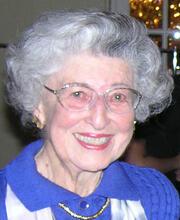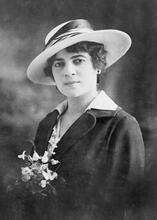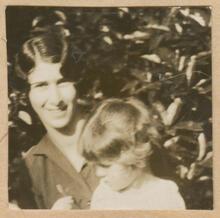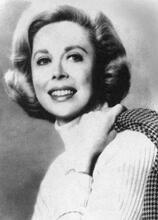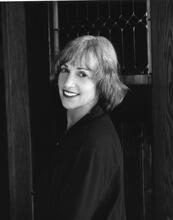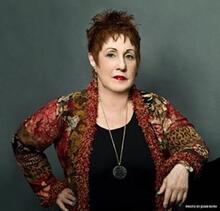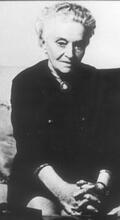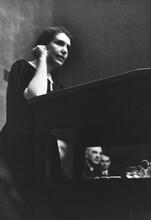Ruth Mack Brunswick
Psychoanalyst Ruth Mack Brunswick served as a crucial sounding board for Sigmund Freud, helping him revise his theories on the importance of the mother in the early shaping of the psyche. Brunswick took psychoanalysis from Freud in Vienna, sparking both a friendship and a long professional association. She taught at the Vienna Psychoanalytic Institute and did innovative work on treatment of psychosis and personality disorders, including on Freud’s “Wolf-Man” patient. In the United States, Brunswick taught at the New York Psychoanalytic Institute and served on the editorial board of the International Journal of Psychoanalysis. Heroically, Brunswick worked to get Austrian Jewish psychoanalysts the visas they needed to escape to America, creating a model for members of other professions to rescue Jewish colleagues.
Article
Psychoanalyst Ruth Mack Brunswick participated in the development of Freudian theory in the 1920s and 1930s as a sounding board for Sigmund Freud’s ideas. As colleague, disciple, patient, interpreter, and liaison to the American psychoanalytic group, her tact in proposing contributions to Freud’s thinking won her ideas a rare acknowledgment. First to use the term “preoedipal” in print, she was one of the women who called to Freud’s attention the importance of the earliest relationship with the mother, the prelude to the father-centered oedipal events that are central to Freud’s theory of the neuroses. She was a pioneer in the attempt to understand the experience of psychotic patients and character-disordered patients within a psychoanalytic framework.
Freud chose Brunswick to treat the “Wolf-Man”—the patient who was the subject of Freud’s most elaborated and important published case—when new symptoms unstabilized the patient years after his work with Freud.
Ruth Mack was born in Chicago on February 17, 1897, the only child of Julian William and Jessie (Fox) Mack. Her father was born in San Francisco but, like her mother, was raised in Cincinnati; both were descendants of old German Jewish immigrant families. Julian Mack was a Zionist, a prominent Reform Jew, and a philanthropist. He was a distinguished liberal jurist, one of the original juvenile court justices in Cook County, Illinois.
She attended Radcliffe College, graduating in 1918. Denied admission to Harvard Medical School because she was a woman, she received her medical education at Tufts University, graduating cum laude in 1922. Soon after, she was accepted for psychoanalysis in Vienna by Sigmund Freud. Thus began a long professional association and friendship.
Ruth Mack was married while a junior at Radcliffe, in 1917, to Hermann Ludwig Blumgart, who became a leading cardiologist and later the director of Boston’s Beth Israel Hospital. They divorced in 1924. In Vienna in 1928, she married Mark Brunswick, a composer and later a professor of music at the City University of New York. Their daughter, Mathilde Juliana Brunswick (Stewart), is a clinical social worker. Ruth and Mark Brunswick divorced in 1945.
Ruth Brunswick was an active member of the Vienna Psychoanalytic Society and an instructor in its Psychoanalytic Institute. She later taught at the New York Psychoanalytic Institute. She served on the editorial board of the International Journal of Psychoanalysis.
After the Austrian Anschluss in 1938 she devoted considerable energy to providing affidavits that enabled Jewish psychoanalysts to procure American visas. Her mastery of this process provided a model to others to rescue their Jewish colleagues. Upon returning to the United States, she practiced psychoanalysis in Manhattan. But her time after leaving Vienna was marked by significant personal and health problems. Her physical suffering led to uncontrolled use of opiates. She died an untimely death on January 24, 1946, at age forty-eight, after a fall.
Selected works by Ruth Mack Brunswick:
“The Analysis of a Case of Paranoia.” Journal of Nervous and Mental Disease 70 (1929).
“The Preoedipal Phase of Libido Development.” Psychoanalytic Quarterly 9 (1940).
“A Supplement to Freud’s History of an Infantile Neurosis.” International Journal of Psychoanalysis 9 (1928).
A small collection of Brunswick’s notes and papers are in the Freud archives at the National Archives, Washington, D.C. Film footage taken by Mark Brunswick of the Freuds, Brunswicks, and others of the Freud circle is preserved in the Freud Museum in London.
Appignanesi, Lisa, and John Forrester. “The Friendship of Women.” In Freud’s Women (1992).
DAB 4.
Freud, Sigmund. Female Sexuality (1961), and New Introductory Lectures (1961).
Gardiner, Muriel. Code Name “Mary” (1983), and The Wolf-Man by the Wolf-Man, editor (1971).
NAW; Nunberg, Herman. “In Memoriam, Ruth Mack Brunswick.” Psychoanalytic Quarterly 15 (1946).
Roazen, Paul. “The Women.” In Freud and His Followers (1975).
“Ruth Brunswick: Freud Associate.” NYTimes, January 26, 1946, 13:3.

